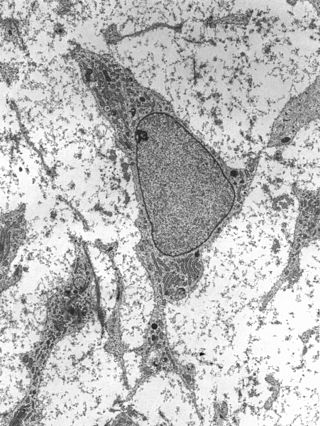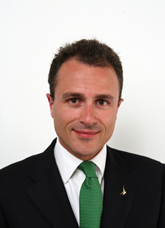Related Research Articles

In multicellular organisms, stem cells are undifferentiated or partially differentiated cells that can change into various types of cells and proliferate indefinitely to produce more of the same stem cell. They are the earliest type of cell in a cell lineage. They are found in both embryonic and adult organisms, but they have slightly different properties in each. They are usually distinguished from progenitor cells, which cannot divide indefinitely, and precursor or blast cells, which are usually committed to differentiating into one cell type.

Medford is a city 6.7 miles (10.8 km) northwest of downtown Boston on the Mystic River in Middlesex County, Massachusetts, United States. At the time of the 2020 U.S. Census, Medford's population was 59,659. It is home to Tufts University, which has its campus on both sides of the Medford and Somerville border.

Amniocentesis is a medical procedure used primarily in the prenatal diagnosis of genetic conditions. It has other uses such as in the assessment of infection and fetal lung maturity. Prenatal diagnostic testing, which includes amniocentesis, is necessary to conclusively diagnose the majority of genetic disorders, with amniocentesis being the gold-standard procedure after 15 weeks' gestation.

Chorionic villus sampling (CVS), sometimes called "chorionic villous sampling", is a form of prenatal diagnosis done to determine chromosomal or genetic disorders in the fetus. It entails sampling of the chorionic villus and testing it for chromosomal abnormalities, usually with FISH or PCR. CVS usually takes place at 10–12 weeks' gestation, earlier than amniocentesis or percutaneous umbilical cord blood sampling. It is the preferred technique before 15 weeks.

The amniotic fluid is the protective liquid contained by the amniotic sac of a gravid amniote. This fluid serves as a cushion for the growing fetus, but also serves to facilitate the exchange of nutrients, water, and biochemical products between mother and fetus.
Gregory Stock is an American biophysicist, best-selling author, biotech entrepreneur, and the former director of the Program on Medicine, Technology and Society at UCLA’s School of Medicine. His interests lie in the scientific and evolutionary as well as ethical, social and political implications of today's revolutions in the life sciences and in information technology and computers.

Genome Valley is an Indian high-technology business district spread across 2,000-acre (8.1 km2)/(3.1 sq mi) in Hyderabad, India. It is located across the suburbs, Turakapally, Shamirpet, Medchal, Uppal, Patancheru, Jeedimetla, Gachibowli and Keesara. The Genome Valley has developed as a cluster for Biomedical research, training and manufacturing. Genome Valley is now into its Phase III, which is about 11 kms from the Phase I and II with the total area approximately 2,000-acre (8.1 km2).
The stem cell controversy concerns the ethics of research involving the development and use of human embryos. Most commonly, this controversy focuses on embryonic stem cells. Not all stem cell research involves human embryos. For example, adult stem cells, amniotic stem cells, and induced pluripotent stem cells do not involve creating, using, or destroying human embryos, and thus are minimally, if at all, controversial. Many less controversial sources of acquiring stem cells include using cells from the umbilical cord, breast milk, and bone marrow, which are not pluripotent.

Chorionic villi are villi that sprout from the chorion to provide maximal contact area with maternal blood.
An amniotic epithelial cell is a form of stem cell extracted from the lining of the inner membrane of the placenta. Amniotic epithelial cells start to develop around 8 days post fertilization. These cells are known to have some of the same markers as embryonic stem cells, more specifically, Oct-4 and nanog. These transcription factors are the basis of the pluripotency of stem cells. Amniotic epithelial cells have the ability to develop into any of the three germ layers: endoderm, mesoderm, and ectoderm. They can develop into several organ tissues specific to these germ layers including heart, brain, and liver. The pluripotency of the human amniotic epithelial cells makes them useful in treating and fighting diseases and disorders of the nervous system as well as other tissues of the human body. Artificial heart valves and working tracheas, as well as muscle, fat, bone, heart, neural and liver cells have all been engineered using amniotic stem cells. Tissues obtained from amniotic cell lines show promise for patients with congenital diseases or malformations of the heart, liver, lungs, kidneys, and cerebral tissue.

Anthony Atala is an American bioengineer, urologist, and pediatric surgeon. He is the W.H. Boyce professor of urology, the founding director of the Wake Forest Institute for Regenerative Medicine, and the chair of the Department of Urology at Wake Forest School of Medicine in North Carolina. His work focuses on the science of regenerative medicine: "a practice that aims to refurbish diseased or damaged tissue using the body's own healthy cells".

Thermo Fisher Scientific Inc. is an American-headquartered life science and clinical research company. It is a global supplier of analytical instruments, clinical development solutions, specialty diagnostics, laboratory, pharmaceutical and biotechnology services. Based in Waltham, Massachusetts, Thermo Fisher was formed through the merger of Thermo Electron and Fisher Scientific in 2006. Thermo Fisher Scientific has acquired other reagent, consumable, instrumentation, and service providers, including Life Technologies Corporation (2013), Alfa Aesar (2015), Affymetrix (2016), FEI Company (2016), BD Advanced Bioprocessing (2018), and PPD (2021).
Merck Millipore was the brand used by Merck Group's global life science business until 2015 when the company re-branded. It was formed when Merck acquired the Millipore Corporation in 2010. Merck is a supplier to the life science industry. The Millipore Corporation was founded in 1954, and listed among the S&P 500 since the early 1990s, as an international biosciences company which makes micrometer pore-size filters and tests. In 2015, Merck acquired Sigma-Aldrich and merged it with Merck Millipore. In the United States and Canada, the life science business is now known as MilliporeSigma.
Cell Signaling Technology, Inc. (CST) is a privately held company that develops and produces antibodies, ELISA kits, ChIP kits, proteomic kits, and other related reagents used to study the cell signaling pathways that impact human health. CST maintains an in-house research program, particularly in the area of cancer research, and has published scientific papers in many peer-reviewed journals.
Stem cell laws are the law rules, and policy governance concerning the sources, research, and uses in treatment of stem cells in humans. These laws have been the source of much controversy and vary significantly by country. In the European Union, stem cell research using the human embryo is permitted in Sweden, Spain, Finland, Belgium, Greece, Britain, Denmark and the Netherlands; however, it is illegal in Germany, Austria, Ireland, Italy, and Portugal. The issue has similarly divided the United States, with several states enforcing a complete ban and others giving support. Elsewhere, Japan, India, Iran, Israel, South Korea, China, and Australia are supportive. However, New Zealand, most of Africa, and most of South America are restrictive.
Amniotic stem cells are the mixture of stem cells that can be obtained from the amniotic fluid as well as the amniotic membrane. They can develop into various tissue types including skin, cartilage, cardiac tissue, nerves, muscle, and bone. The cells also have potential medical applications, especially in organ regeneration.

Marco Giovanni Reguzzoni is an Italian politician and entrepreneur. He was President of Varese Province from 2002 to 2008. He was a member of the Italian Parliament as congressman and president of the Northern League group since 2013 and now he is the President of Volandia, the largest museum of flight in Europe.
Giuseppe Simoni is an Italian biologist and scientist. He was born in Pavia, Italy in 1944, and obtained his degree in biology at the University of Milan, where he later became a professor of genetics and biology for thirteen years.
An amniotic stem cell bank is a facility that stores stem cells derived from amniotic fluid for future use. Stem cell samples in private banks are stored specifically for use by the individual person from whom such cells have been collected and the banking costs are paid by such person. The sample can later be retrieved only by that individual and for the use by such individual or, in many cases, by her or his first-degree blood relatives. In case of amniotic fluid stem cell banking, the mother providing the donation initially has ownership of the stem cells and financial responsibility for its storage. When the child from that pregnancy reaches legal age, the ownership and responsibility for the sample may be transferred. The first private amniotic stem cell bank in the US was opened by Bio cell Center in October 2009 in Medford, Massachusetts.

Incorporated in May 2001, Cordlife Group Limited, is a consumer health company and one of the leading providers of cord blood and cord lining banking services in Asia. Cordlife has been listed on the mainboard of SGX since March 2012.
References
- ↑ Nickisch, Curt (22 October 2009). "World's First Amniotic Stem Cell Bank Opens In Medford". WBUR News. Retrieved 10 June 2018.
- ↑ (Lancet, 1983)
- ↑ "Tomalab". www.tomalab.com. Archived from the original on 11 March 2022. Retrieved 22 May 2022.
- ↑ ITALY - Stem cells from amniotic liquid, new hopes [ permanent dead link ] Published by Stem Man 5 May 2009, Latest Stem Cells News”
- ↑ Biocell Center - Intro on YouTube
- ↑ "European Biotech Company Biocell Center Opens First U.S. Facility for Preservation of Amniotic Stem Cells in Medford, Massachusetts | FreshNews.com". Archived from the original on 2010-02-21. Retrieved 2009-10-30.
- ↑ "European Biotech Company Biocell Center Opens First U.S. Facility for Preservation of Amniotic Stem Cells in Medford | www.luminogenics.com". Archived from the original on 2010-02-21. Retrieved 2009-10-30.
- MassDevice
- PRNewswire
- WLA
- Euro Stem Cell
- Swiss news
- Smart Brief Archived 2012-05-21 at the Wayback Machine
- Associated press